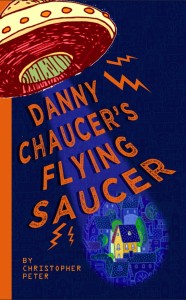“Space: The Next Frontier in Children’s Books?”
As a kid I loved science fiction. My imagination was fired by stories set in space, a place of boundless possibilities; tales of future worlds, stunning galaxies, brave human colonists, exotic aliens.
As I began writing the Danny Chaucer’s Flying Saucer series, I renewed my interest in all things space-y, particularly books aimed at 8-12-year-olds / middle grade. But sci-fi isn’t exactly in vogue in children’s literature right now, or at least not space-set books specifically. It got me thinking, why not?
Fashions come and go of course. But I also wonder whether it’s because, space-wise, the future turned out to be a bit of a, well, disappointment really. I mean, I’m too young to remember the Apollo moon missions of the 1960s and 1970s, but I did fall in love with books in the years soon after, and it was a time very much influenced by those heady lunar-treading days when anything seemed not only possible but also within imminent reach.
Look back at movies like 2001 and Blade Runner and TV shows like Space 1999. Back then, dates like 1999, 2001 – and certainly 2015 – seemed impossibly futuristic. Surely we’d have flying cars, moon bases, men on Mars, and charismatic yet slightly sinister AI computers by then, right? Well – um – not exactly … but hey, we do have very cool phones …
(And by the way, what happened to that army of robots that were supposed to gift us all carefree lives of leisure and pleasure??)
I’m not dismissing NASA by the way, nor the other research agencies and institutions with all their talented and dedicated people. Nor have I forgotten the space shuttle. And yes, space exploration is mind-numbingly expensive. It’s just that – I don’t know – as amazing as the International Space Station is, it’s not exactly a Martian colony. (And speaking of Mars, disappointingly it turned out not to be home to little green aliens after all.) I can’t help thinking the child of 1970 would be asking, ‘Is that it?’
And yet I believe things are changing. In 2019 we’ll be celebrating the 50th anniversary of Neil Armstrong’s historic first step on the moon, and we’ll be reminded again of what a galactically awesome achievement that really was (especially with 1960s technology!). Meanwhile there’s much excitement about a manned mission to Mars, with some even predicting it could happen in the next 10-15 years, with a permanent colony not long after.
The amazing pictures of Pluto recently sent back by the New Horizons probe have come after the steady stream of incredible images of deep space from the Hubble space telescope.
We’ve got the eagerly-awaited new Star Wars movie coming soon, and that’s following some pretty amazing sci-fi cinema in recent years – think Moon, Gravity, Ex Machina and Interstellar. Meanwhile sci-fi continues to thrive on the small screen too.
So why not children’s books?
The whole concept of space has the incredible ability to feed the imaginations of the young (and old). The possibilities are literally endless. We’ve already been to the moon and sent unmanned spacecraft to Mars and far beyond. What will the human race have achieved in another fifty years? A hundred? Five hundred?
And what about life on other worlds? Of course we haven’t come across aliens yet (or so we’re told …) but that mind-bending prospect remains.
Writing about space and sci-fi is also a brilliant opportunity to encourage kids’ interest in science. Space is an amazing, huge, fascinating place, about which we’re finding out more and more incredible things all the time. Just take a look at some of the dazzling Hubble images. Consider for example the famous picture of the Pillars of Creation in the Eagle Nebula. How dizzyingly huge it is, how unimaginably far away … and how it’s a place where stars are made! It’s almost beyond words (though I’ve had a crack at describing it in Danny Chaucer. I simply had to include it).
And of course (on a clear night at least) you can look up and see space for yourselves! Well part of it anyway.
I want kids today to discover the power of stories, especially boys who generally less inclined to read than girls and so may need more encouragement. And the 8-12 age group is a vitally important time for fostering a love of books, an age when children start to read more independently and develop their own tastes.
I wrote Danny Chaucer partly for my own sons, the older of whom is now 11 and hasn’t been getting into books very much. He doesn’t particularly like the fantasy, paranormal or dystopian themes which seem to dominate children’s fiction these days. He does however like science and gadgets and is into Doctor Who, so space is right up his street.
To finish, I’d like to highlight a small selection of kids’ sci-fi books – some old favourites, some new, but all have the power to launch young imaginations into the great beyond … all ideal for 8-12-year-olds, depending on reading ability, though the last two might be less suited to younger readers.
- Doctor Who and the Daleks, by David Whitaker. A classic Who adventure, launching an ordinary man from his humdrum earth-bound existence to a distant alien world with distinctly unfriendly inhabitants. And if this goes down well, there are dozens of other Doctor Who books including a series aimed especially at younger readers (the Young Reader Adventures).
- Cosmic, by Frank Cottrell Boyce. A young boy gets to go on a mission to the moon! Slightly slow build-up so it takes a long time to take off (literally), but it’s worth sticking with. The writing is great – funny and moving in places, with strong likeable characters. Quite educational too – the reader really gets a feel of what it would be like in space.
- Jacob Wonderbar and the Cosmic Space Kapow, by Nathan Bransford. In contrast to Cosmic, this book makes no pretence to be educational, but it’s fun, fast-moving and wonderfully imaginative, and may appeal to younger readers in particular.
- The Lotus Caves, by John Christopher. On the moon, two bored teenagers go off in a lunar rover and discover something amazing. A classic from a renowned YA sci-fi author.
- Futuretrack 5, by Robert Westall. More YA (probably 11+ I’d say) with some adult themes, this is actually an earth-bound dystopian thriller, but I had to include it because it’s brilliant and by one of my all-time favourite authors. Dark, witty, compelling and with an unexpected ending.
- Galactic Warlord, by Douglas Hill. Again, may be better for 10/11+ as there’s some violence, though nothing too gratuitous or graphic. I read this when I was about 10 and loved it. Set in distant space, a lone survivor of an attack on his planet broods and plans revenge … the first book in a series of five.
Danny Chaucer’s Flying Saucer Summary:
One night Danny Chaucer, a lonely eleven-year-old boy, sees a strange light and hears odd sounds in his garden – and the next day there seems to be something there but he can’t quite see it. His Uncle Colin, who works at the mysterious Ganymede Institute, reveals that something top-secret has gone missing from there. Danny teams up with the new girl in his class, Nat Ford, to dodge the school bullies and investigate what’s going on. They encounter the sinister Captain Frost who is also on the trail of the mysterious missing object. Danny works out how to make the thing in his garden become visible, and it is revealed to be a flying saucer. Inside Danny and Nat meet the computer, BOB, who controls the saucer. Meanwhile Captain Frost is close to tracking down the saucer too, and she manages to get on board. They all take off and into space and then on a virtual reality journey to the Pillars of Creation in the distant reaches of the galaxy. Captain Frost intends to sell the saucer for her own profit, but Danny outwits her, and then the saucer terrifies the school bullies back on Earth. Finally BOB wipes Captain Frost’s memory to foil her plans, and then the saucer takes off leaving Danny and Nat to keep their adventure a secret.
Book Passage:
What would you do if a flying saucer landed outside your home?
Danny Chaucer is lonely. Life’s boring since his best friend moved away. Nat Ford is the new girl in class and spends half her time trying to dodge the school bullies.
Nothing interesting ever happens in their dead-end village. Nothing that is until one still, starry night when something lands in the trees behind Danny’s house. And then the sinister Captain Frost arrives…
There might be only one way to escape—and that’s up…
About the Author: Christopher lives near Oxford, UK and is married with three children. He has always loved writing but only began to write more seriously after he turned 40 (a kind of mid-life crisis perhaps?). He self-published two YA novels (Falling Girl and BASIC Boy), before writing Danny Chaucer’s Flying Saucer. He has always leaned towards writing for children and teenagers because he feels strongly that good stories are very important to help the younger generation fall in love with the written word; this will enrich their whole lives; and also because he has such fond memories of the books he loved which shaped him when he was younger.
Thank you so much to Christopher for his reflections on space as the next frontier!



